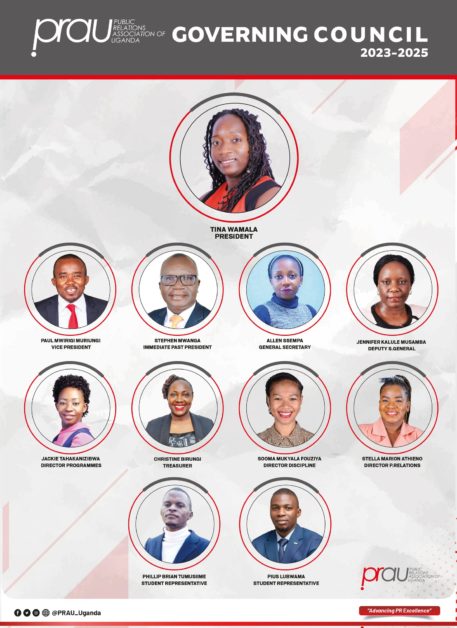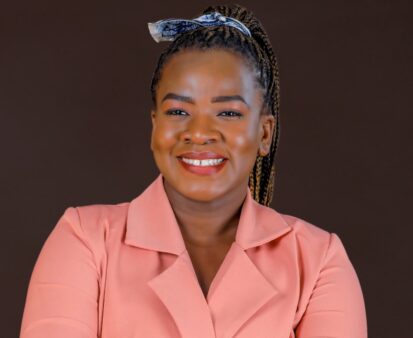What inspired you to become the new President of the Public Relations Association, and what do you hope to achieve during your tenure?
I have been a committed member of the Public Relations Association of Uganda (PRAU) for over 10 years now and this is an industry I am extremely passionate about. Having served on the previous Governing Council (GC) as Vice President I was exposed to the potential growth and advancement the association could make and I wanted to contribute to the growth of the industry and support PR excellence in Uganda.
Under my leadership, I will lobby for the establishment of statutory recognition to promote and advance the PR and communications profession by setting best practice and ethical standards. Statutory recognition can help us establish industry standards and guidelines.
I also want to enhance the professionalism of our members through skills development by launching short practical PR courses in partnership with Makerere University. This is key to staying ahead of the fast-paced PR industry. I am determined to introduce a mentorship programme to support the development of the next generation of PR and comms professionals. I think we need to stamp our authority in the industry and should contribute towards thought leadership on matters of national interest related to our profession.
There is need to advocate for the importance of PR; by promoting the critical role that PR plays in shaping public opinion and influencing decision-making, and to advocate for the importance of PR today. Our association cannot be sustained without boosting membership to include professionals across sectors, and regions.
There is a need for national representation, to enhance our membership’s diversity and be more inclusive of professionals across the country. We need to harness existing strategic partnerships to enhance synergies and understanding between PR and other related professions i.e. HR, Marketing, journalists, CEOs and to strengthen the association’s presence in the industry by increasing visibility and collaboration with key partners and related associations.
What challenges do you think the public relations industry faces, and how do you hope to address them?
The practice of PR in Uganda is unregulated meaning it is difficult to regulate who joins the profession or claims to be a PR practitioner. As a result, PRAU’s membership entry is voluntary in nature not compelling practitioners to join the umbrella body. There is no standard code of professional conduct that defines the framework for PR practice in the country which leads to incidences of unethical PR practices that go unchecked. If statutory recognition is realised, it shall offer a framework for guidance and regulation for PR practice in Uganda. This shall include streamlining how one can join the PR profession, a clear Code of Conduct that all members of the profession should adhere to, a clear structure for Continuous Professional Development, minimal academic qualifications/experience, and strengthening systems for restraining unethical practices, among other considerations.

There continues to be a significant number of practitioners and organisations that misinterpret or appreciate PR. Some practitioners commence their careers as novices without acquiring some training or mentorship to aid their conceptual and practical understanding of the profession. This has resulted in significant misunderstandings about what PR is, and the value that it brings to an organisation. Some of the initiatives we aim to undertake include;
Designing and implementing campaigns to enhance better understanding and appreciation of the PR practice in Uganda, profile and amplify the image of the PR practice in Uganda, including best practices and implement thought leadership engagement that aims to position PR as a strategic organisational management position to mention but a few.
What advice would you give to young professionals who are starting out in their careers in the public relations industry?
I would encourage young professionals to invest in their professional growth and seek opportunities to learn and grow, to be curious and have an appetite to enhance their skills by taking relevant courses, certification and workshopping. They need to learn the basics of media relations, stay afloat with the latest trends and technologies and benchmark best practices in the PR field. It is important that they cultivate relationships with journalists, harness their stakeholder engagement skills and expand their networks in the industry. I would also encourage them to get mentors who they will learn from, seek guidance from, learn both their successes and failures to continually improve their skills and performance. I would encourage them to be proactive in research and to uphold high ethical standards in PR practice such as honesty, transparency and integrity.
How do you think public relations can help businesses and organisations navigate sensitive issues, such as crises or a controversial product launches?
Public relations can help organisations navigate sensitive issues including managing potential crises by developing and implementing strategic crisis communication plans to ensure accurate information is disseminated and any potential misinformation is addressed promptly.
Public relations can also track the sentiments of clients and stakeholders to their communication by managing a company’s reputation during a sensitive period. This includes monitoring and managing online conversations, social media, and traditional media to understand public sentiment, identify potential risks, and respond appropriately.
Through our proficient media relations, community engagement, and stakeholder communications, we can help mitigate the impact of a crisis or a controversial situation. Public relations can help monitor and analyse the impact of a sensitive issue on the organisation’s reputation, brand image, and stakeholder perception by closely tracking media coverage and social media conversations. We can provide insights and recommendations to inform decision-making, adjust communication strategies, and mitigate potential risks. PR can engage with our stakeholders effectively, including employees, customers, shareholders, partners, and the wider community. This can involve developing tailored communication strategies and messages that align with the organisations’ values, addressing our clients’ concerns, providing regular updates, and addressing questions and feedback which help to build public trust.
What role do you see public relations playing in shaping public opinion on important issues, such as social justice and environmental sustainability?
PR can raise awareness about social justice and environmental issues by creating awareness and implementing campaigns that inform the public about the challenges, impact and potential solutions. This will help the organisation gain visibility, ignite interest and understanding and create a sense of urgency around these issues. PR can shape the narrative around social justice and environmental issues closely aligned to the organisations’ values that evoke emotion and drives action amongst our audiences.

Through stakeholder, engagement PR can engage various state holders to support social justice and environmental sustainability initiatives by encouraging them to take action, participate and be ambassadors for change.
PR can also play a role in advocating for policy changes related to social justice and environmental sustainability. PR professionals can engage in lobbying efforts, work with policymakers, and leverage our communication skills to influence legislation, regulations, and public policies that promote these issues.
Lastly, PR can help manage organisations’ reputation in the event of crises around these issues by addressing public concerns, providing accurate information, and demonstrating the organisation’s commitment to addressing the issue at hand. Through strategic communication efforts, PR professionals can influence public opinion, promote positive change, and contribute to the advancement of these critical issues.
Can you discuss any current or upcoming initiatives that the Public Relations Association will be undertaking to advance the industry and its practitioners?
I am excited about launching the Makerere Universtiy/PRAU practical courses which will focus on capacity building and skills development for our members. We are also keen to launch an internal campaign, using internal experts to share best practices & successes in their area of work because through continuous engagement amongst ourselves, we can only enhance our skills.
We are excited to launch the second edition of the PR Symposium in Uganda later on this year which will bring together key stakeholders to discuss topical issues affecting our industry, in order for us to learn from each other’s experiences.
Uganda has been given the honour of hosting this year’s East Africa PR Week, which will be a great opportunity for us to showcase our successes in the PR industry and to synergise PR efforts across the region. This will bring expert voices from the region and continent to discuss the future of PR and we shall position Uganda as the prototype given our incredible successes over the last few years.
I look forward to also rolling out the mentorship programme, by linking up PR experts with the next generation of PR professionals in Uganda in order to support their career growth and given them confidence as they prepare for the job market.
Pursuing statutory recognition is high on our agenda and we shall continue to engage stakeholders on the bill until it is ready to be passed by law.
How do you balance the need for transparency and honesty in public relations with the need to protect a client’s reputation and image?
It is important to establish open communication with clients from the onset, setting realistic goals, and being transparent about the potential risks and challenges of our PR efforts. Continuous status updates about ongoing communication throughout the PR campaign in order to keep the client informed about any developments, both positive and negative are important. We should adhere to a strict code of ethics that includes tenets such as honesty, integrity, and transparency to make decisions that are in the best interest of all stakeholders. We also need to educate our clients about the importance of transparency and honesty in PR so that we can establish a shared understanding and expectation of how communications will be handled. Through this approach you will the client satisfied, and aligned to the opportunities and challenges of the PR while maintaining PR integrity.
In your opinion what is the biggest misconception people have about public relations, and how do you plan to address it?
There are a number of misconceptions about PR, but I will mention two of the most common. Some people assume that PR and marketing are the same. PR and marketing are related but distinct fields. Marketing involves paid advertising that is controlled by the organisation while PR involves earned media, which stems from building relationships with the media and generating news and coverage for our organisations.
The other misconception about PR is that it is a profession that can be done by anyone regardless of their background. However, PR has evolved into a strategic function that requires strategic planning, research, insights analysis, relationship building and stakeholder engagement. It’s a complex field that requires experience and expertise to effectively manage an organisation’s reputation and brand using effective communication efforts. PR requires a deep understanding of communication principles, understanding of the media landscape and stakeholder engagement while maintaining ethical standards to succeed in your role. PR continues to grow in this dynamic and ever-evolving world.

 The Future is Creative: Gen Z, Talent, and the New Workforce Reshaping Uganda’s Advertising Industry
The Future is Creative: Gen Z, Talent, and the New Workforce Reshaping Uganda’s Advertising Industry


